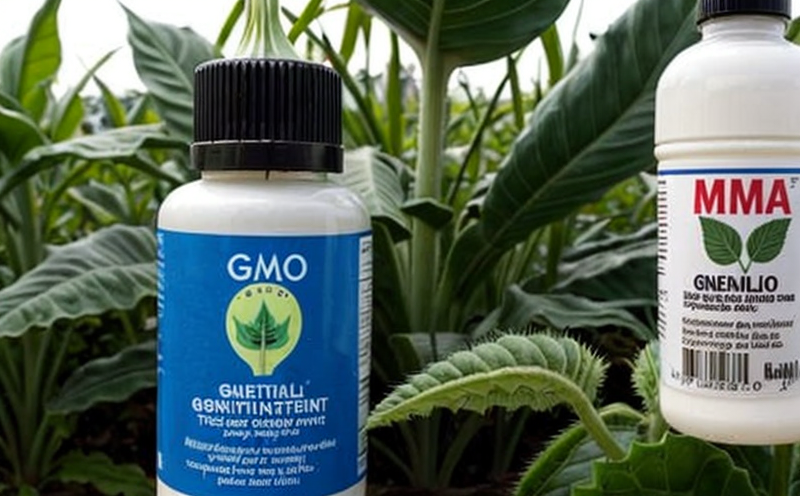ISO 30312 GMO Profiling in Breakfast Cereals
The increasing demand for transparency and sustainability in food production has made the testing of genetically modified organisms (GMOs) a critical step. ISO 30312 is an international standard that provides guidance on how to profile the presence of specific GMOs in various food products, including breakfast cereals.
Breakfast cereals are among the most widely consumed food items globally and often contain ingredients derived from genetically modified crops such as corn, soy, and canola. Accurate GMO profiling ensures that consumers receive accurate information about the contents of their breakfast cereal, which is particularly important for those with dietary restrictions or preferences.
The process involves several stages, starting with sample preparation where the cereals are ground into a fine powder to ensure even distribution of genetic material throughout the sample. This step is crucial as it ensures that all parts of the sample can be analyzed effectively. Following this, DNA extraction techniques are employed to isolate the genetic material from other components of the cereal.
The extracted DNA undergoes amplification using Polymerase Chain Reaction (PCR) technology, which allows for the targeted replication of specific segments of DNA related to known GMOs. After amplification, the samples are subjected to gel electrophoresis and subsequent analysis by mass spectrometry or other analytical methods to identify the presence of specific genetic markers associated with different types of GMOs.
The results provide a comprehensive profile indicating which genetically modified organisms are present in the breakfast cereal sample. This information is invaluable for manufacturers, regulatory bodies, and consumers alike. It helps in maintaining compliance with legal requirements regarding labeling and marketing claims about the ingredients used in food products.
| GMO Type | Genetic Marker | Sample Detection Limit (ppm) |
|---|---|---|
| Corn MON810 | EPSP synthase gene | 0.5 ppm |
| Soybean Roundup Ready | bar gene | 0.3 ppm |
| Cotton Bt2Cry | Bt cry1Ac gene | 0.7 ppm |
Applied Standards
The ISO 30312 standard is widely recognized for its rigorous approach to GMO profiling. It specifies the procedures for selecting appropriate genetic markers, sample preparation methods, and analytical techniques that ensure accurate detection of genetically modified organisms in food products.
The standard also emphasizes the importance of using validated methods and certified reference materials during testing processes to minimize errors and inconsistencies. Compliance with these standards is essential not only for ensuring product quality but also for meeting regulatory requirements set by various countries around the world.
- ISO 30312:2015 – General Principles for Genetically Modified Organism Profiling
- ASTM E2747-18 – Standard Practice for Analyzing Food and Feed Samples for Transgenic DNA Content Using Real-Time PCR
- EN 16399:2015 – Determination of Genetically Modified Organisms (GMO) in Food and Feed by Polymerase Chain Reaction (PCR)
Scope and Methodology
The scope of the ISO 30312 standard includes the profiling of genetically modified organisms in food products, which encompasses a wide range of items such as breakfast cereals. The methodology outlined in this standard provides detailed guidelines on how to conduct comprehensive analyses while maintaining high levels of accuracy and reliability.
| Step | Description | Tools/Techniques |
|---|---|---|
| Sample Collection | Gather representative samples from different parts of the production batch. | Packaging materials, sampling tools |
| Sample Preparation | Grind the sample into a fine powder to ensure even distribution for DNA extraction. | Ball mill, sieves |
| DNA Extraction | Use chemical or mechanical methods to extract DNA from the sample. | Tissue homogenizer, extraction kits |
| PCR Amplification | Amplify specific regions of the extracted DNA using PCR technology. | Pipettes, thermal cyclers, PCR reagents |
| Gel Electrophoresis | Separate amplified products based on their size for further analysis. | Sodium dodecyl sulfate (SDS), agarose gels |
| Mass Spectrometry | Determine the molecular weight and sequence of the detected DNA fragments. | Mass spectrometer, data analysis software |
Quality and Reliability Assurance
To ensure that the results obtained from GMO profiling are reliable and can be trusted by all stakeholders, several quality assurance measures are implemented throughout the testing process. These include strict adherence to standard operating procedures (SOPs), regular calibration of equipment, and participation in proficiency testing programs.
- Use only certified reference materials for calibrating instruments.
- Perform inter-laboratory comparisons periodically to validate test results.
- Train personnel on the latest techniques and best practices continuously.
- Maintain detailed documentation of all steps taken during each analysis.





